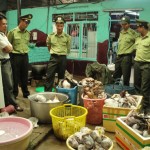
Victory for wildlife protection in Vietnam: A proposed wildlife law which would have opened the floodgates for commercial farming and trade in endangered species has been defeated.
New legislation — which was proposed by Vietnam’s Ministry of Agriculture and Rural Development (MARD) — threatened to undermine more than 20 years of progress in wildlife protection in Vietnam and put the country’s most endangered species at risk. It would have allowed commercial trade in endangered species “not sourced directly from the wild”, thereby creating a loophole for “farming” wildlife, such as tigers, rhinos, bears, and gibbons.
Had this decree been enacted, it would have compromised law enforcement efforts by providing criminal networks with the means to launder illegal wildlife products with legal channels. And it would have increased demand for wildlife products by sending a message to the public that commercial exploitation of endangered species is acceptable. Despite what wildife-farming advocates claim, the expansion of farming operations to meet rising demand does not relieve pressure on wild populations.
Education for Nature – Vietnam (ENV) has been deeply involved in efforts to address weaknesses in early drafts of the law and has countered pro-farming arguments by pointing out that wild-caught Siamese crocodiles continue to be hunted and sold to farms in Vietnam, demonstrating how crocodile farming and the development of a legal trade in a critically endangered species has failed to relieve pressure on wild populations.
ENV also pushed to change the language in another proposed endangered species law that was drafted in 2012 by the Ministry of Natural Resources and the Environment (MONRE), because early versions of the draft contained similar allowances for commercial trade in endangered species.
However, the new law (MONRE Decree 160) which was signed into law November 15, 2013 prohibits any form of commercial trade in listed endangered species, regardless of origin, “a great victory for wildlife protection,” according to ENV director Vu Thi Quyen.
“The process was not an easy one, requiring careful reviews of draft legislation, recommending changes in writing that would strengthen the law, commenting and recommending removal of things that would weaken the law, present loopholes, undermine wildlife protection — all of which were found in both MONRE and MARD drafts early on.”
While the new law affords full protection to endangered species, it does not necessarily regulate commercial activities.
ENV had another major legislative victory this month with the signing of Decree 31, the marine fisheries law, which provides much stronger protection for marine turtles and other marine species. “All of our comments were included and the law was revised without even a fight.”
- Learn more about Education for Nature-Vietnam
- Listen to an interview with ENV’s founder, Quyen Vu: Tackling Wildlife Crime in Vietnam
Editor’s note: This article was updated on November 21, 2013.




